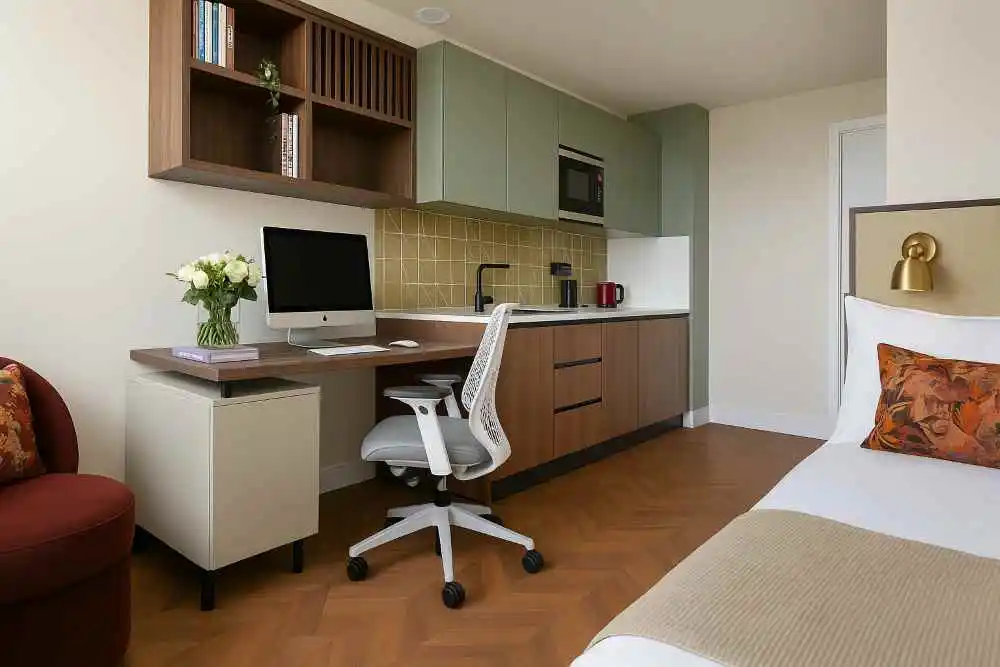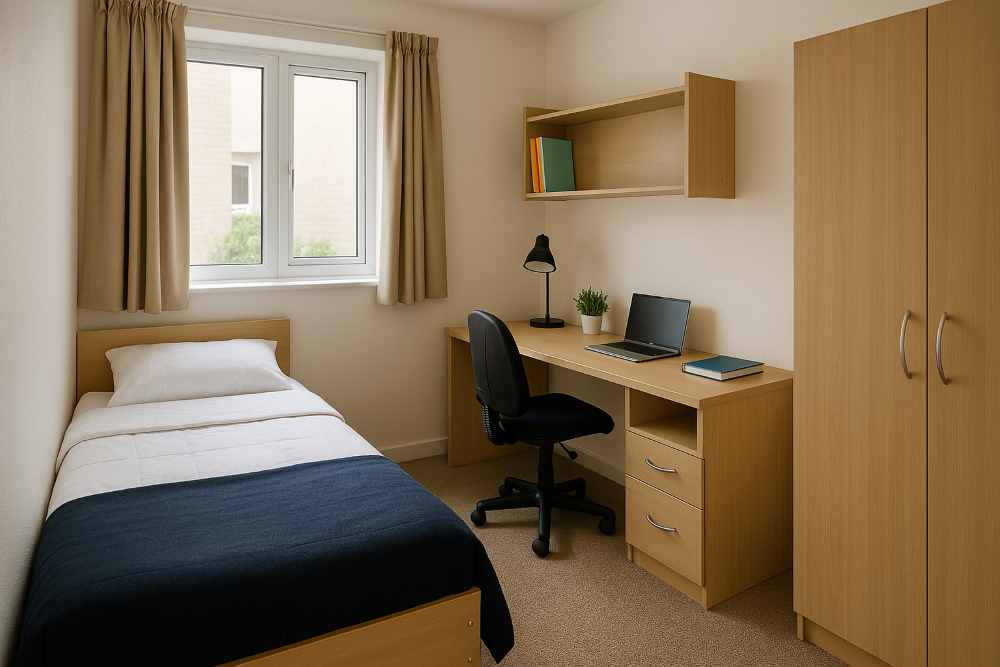Stepping into university life comes with brand new experiences filled with excitement, independence, late-night study sessions and more. But before you enter your very first class, there is one big decision every student has to make is where to live.
The right student accommodation can shape the whole experience of student living, including opportunities to grow, relax and thrive. However, figuring out student accommodation in the UK may seem like a challenge. Especially, when it comes to accommodation providers like Uninist, they ensure to make the whole process easy and hassle-free.
Whether you dream of cozy studio student apartments or stylish en-suites rooms, every city has something for everyone in the UK. As we are spread across nine cities in the UK, we bring some of the best student accommodations near the top UK universities. Simply put, dive into the blog to find a place near your university to experience convenience and comfort!
Top Student Housing Near Universities in the UK
From offering flexible leases to several housing listings, here are the top cities we are available in the UK:
- 1. Birmingham
- 2. Cardiff
- 3. Manchester
- 4. Liverpool
- 5. Leeds
- 6. Bristol
- 7. Glasgow
- 8. Derby
- 9. Oxford
While you figure out where to go for international education, we bring several student residences to the abovementioned cities. Let’s explore in detail:
Birmingham
Birmingham is the vibrant heart of midlands in the UK. Being home to 5 major universities and one of the youngest populations, it is the ultimate student hub. Whether you wish to enjoy indie vibes at Digbeth or dig into the food heaven of Balti Triangle, there’s something for everyone.
As for student accommodation in Birmingham, we have four places to live close to major universities. The top student housing in Birmingham include:
- 1. The Heights Birmingham: One of the most recent additions to Uninist is the Heights Birmingham. Located at 30 Staniforth St, this amazing place brings modern-designed studios and ensuite rooms. With contemporary furnishings, every room comes with large wardrobes, ample windows, dedicated workstations, double beds and more. If it still seems less, there is more to the building. You will also find private bathrooms, private/shared kitchens and many other exceptional facilities. As a student of Birmingham City University or Aston University, this property is just a short distance away. Moreover, the price of this property starts only from £163 per week.
- 2. Pebble Mill Student Accommodation Birmingham: Conveniently located at Pershore Rd, this student housing has been gaining popularity for its comfort. With both long-term and short-term student accommodation, you can find maintenance facilities, 24-hour security, and other services. As for universities, the closest universities are the University of Birmingham and Birmingham City University, City South Campus. Plus, the price of student rooms starts just from £318 per week.
- 3. Jennens Court Birmingham: Jennens Court Birmingham is another beautiful listing located at 250 Jennens Rd. Sitting just a mile away from Birmingham City University, Aston University, Matthew Boulton College and the University College Birmingham, students can live a comfortable life. Offering both private and shared facilities, this property provides everything you require. Along with on-site facilities, you can also expect to find plenty of off-site facilities nearby. In addition, the cost of this housing starts from £178 per week, making it affordable.
- 4. Mary Sturge Birmingham: Locates Aston Rd, Mary Sturge Birmingham has been popular among students of the University of Birmingham and Birmingham City University. With many student rooms in Birmingham, this accommodation has something for every student. You will find top-notch maintenance facilities, 24-hour security, and safety services. In addition to comfortable rooms and safety, the student flat starts only from £202 per week.
Cardiff
Cardiff is a city of full characters by offering a blend of historic charm and modern beauty. Home to numerous universities and language schools, Cardiff has always been students’ favourite destination. As for student accommodation in Cardiff, some of the top choices include:
- 1. Park Place: This off-campus housing is conveniently located at a prime location of Vita Student Park Place in Cathays.You can find studios with state-of-the-art fixtures, furnishings, warm bedrooms, spacious closets and more. Besides basic facilities, this property also has fully equipped kitchens, bathrooms, smart TV, study spaces and more. All in all, the price of this listing just starts at £272 per week, making it budget-friendly. In addition, this property is just a mile away from both Cardiff University and Cardiff Metropolitan University.
- 2. West Wing Cardiff: West Wing is another beautiful student housing in Cardiff located at Glossop Rd. With ensuite rooms and studios, you can enjoy both flexibility and affordability. Plus, this property is close to Cardiff Sixth Form College, Cardiff University, University of Wales and Royal Welsh College of Music & Drama. The student rooms come with the latest technology, modern furnishings, pleasant bedrooms, common spaces and more. Not only rooms but communal spaces also come with lots of facilities. In addition to on-site facilities, this property is also close to shops, pharmacies, restaurants, cafes and more. Plus, student residences at this property just start at £190 per week onwards.
Manchester
Manchester has always been a city where cultural diversity meets campus life. Taking forward the ritual, student accommodation in Manchester has started following the same. Home to many world-famous universities, you’re not just studying—you’re part of a cultural movement.
Some of the affordable and flexible student accommodation in Manchester include:
- 1. Uninist Manchester Flexi Stays 01: Located at 100 Blackfriars Road in Salford, this property is ideal for students of University of Salford, UCEN Manchester City campus and Salford Business School. With a variety of cluster en-suite rooms, this property has always been about offering convenience and comfort. You will find a private bathroom, modern shared kitchens, dining, and living areas. All in all, the cost of rooms starts just at £198 per week.
- 2. River Street Tower Residence, Manchester: This another most loved property that is located at 2 River Street in River Street Tower. Starting just from £175 per week, this property comes with many facilities and services. You will find spacious rooms, gyms, storage spaces, communal spaces and more. As a result, students of the University of Manchester and Manchester Metropolitan University can consider this place to live.
- 3. First Street Student Accommodation Manchester: Lastly, this student housing is a beautiful place to live situated at 13 Jack Rosenthal Street. Offering a mix of convenience and luxury, this property has rooms starting from just £330 per week. Moreover, Manchester Metropolitan University, Manchester Metropolitan University Business School and Arden University are the closest universities to this housing.
Liverpool
From education to sports, Liverpool has been a top contender in every aspect. This lively and soulful city wears its heart on its sleeve. Bringing convenience at your doorsteps, there are many options close to University of Liverpool, Liverpool John Moores University and Liverpool Hope University. Some of the top student housing in Liverpool include:
- 1. Prospect Point Liverpool: Located at 60 Moira Street, this development is ideal for students of LIPA, the University of Liverpool, the Liverpool John Moores University, the Liverpool Hope University and the University of Chester. As one of the short-term student accommodation options, this place is equipped with numerous facilities. Along with beautiful student rooms, you will also find Kays Pharmacy, Tesco Express and other stores nearby. Moreover, the rent of this housing also starts from only £129 per week.
- 2. Crosshall Street Liverpool: This is another popular choice among students situated at 5-7 Crosshall St. Ideal for students of LIPA, the University of Liverpool, Liverpool John Moores University and the Liverpool Hope University, this property comes with various facilities. Equipped with new facilities, this place offers everything a student requires. As for nearby facilities, you will find ASK Italian, Five Guys, Boots Pharmacy and more. Moreover, the cost of rooms also starts from only £198 per week.
Leeds
Leeds has always been a city offering a blend of academic excellence and unbeatable student life. Be it education or student housing in Liverpool, there is affordability and flexibility in everything. Meeting the expectations of the northern powerhouse for students, some of the best student apartments in Liverpool include:
- 1. St. Albans Leeds: This development has gained popularity because of its beauty and cost of living. Located at Cross Belgrave Street, this property brings flexibility and affordability with flexible leases and rent starting just from £338 per week. Major universities such as Leeds Beckett University, University of Leeds and Arden University are just a mile away. In addition, you will find student rooms with all the essentials and 24 hour safety, making it ideal and safe for students.
- Oxley Residence: Another gem by Uninist is Oxley Residence located at Weetwood Ln. Sitting just a short distance away from the City centre, this property starts only from £143 per week. The closest university to this property is the University of Leeds and Leeds Arts University. Hence, students can expect to find comfortable rooms with many facilities in and outside property.
- Uninist Leeds Flexi Stays 02: Located at the prime location of Jackson House, this flexible student accommodation in Leeds is an epitome of comfort. Ideal for students of Leeds University, Leeds Beckett and Leeds Arts University, this property has everything a student needs. Lastly, the cost of this property also starts from just £211 per week.
Bristol
Creative, green, and a little bit rebellious, Bristol is the perfect mix of intellect and innovation. As the bohemian brain of the west, this city is home to many top universities and a buzzing arts scene. Complementing the vibe, you will also find both long-term and short-term student accommodation in Bristol.
One of the best choices in Bristol by Uninist is The Malthouse Residence located at 29 Wilder Street. This most loved property sits between everything. From local stores to high-end restaurants, you can find everything you want. With the largest variety of student rooms in Bristol, this property brings the following options:
- Gold XL En-Suite
- Gold En-Suite
- Silver En-Suite
- Bronze En-Suite and
- Gold Studio
Moreover, the cost of all student apartments is just starting from £229 per week. Students of BPP University Bristol, the University of Bristol, City of Bristol College and the University of the West of England can explore this property.
Glasgow
As Scotland’s cultural capital, Glasgow is a city that comes with boldness, artistic vibes and charmness. With world-class universities and a legendary music and nightlife scene, student life is always buzzing in Glasgow. Matching the vibe and charm, one of the best student housing in Glasgow at Uninist is Boyce House Residence, located at 47 Kyle Street.
As one of the most loved properties, this housing comes with the following kinds of student rooms in Glasgow:
- Bronze En-Suite Mid Level
- Silver En-Suite Mid Level
- Silver En-Suite Upper and
- Silver En-Suite Penthouse
Starting as low as £202 per week, each option is full of modern facilities, spacious beds, large wardrobes, study spaces and more. Additionally, the communal space has plenty of games, storage spaces, study spaces and more. Besides on-site amenities, BOOTS, Tesco Express, La Vita and other amenities are also just a few steps away. All in all, students of the University of Strathclyde, University of Glasgow and Wolfson Medical School can explore this place.
Derby
Derby has always been a hidden gem in the United Kingdom for student living. From offering high-quality education to a convenient lifestyle, this city is ideal for students looking for budget-friendly university experience.
With flexible student accommodation in Derby, students can enjoy cosy living with friendly faces and just the right dose of city buzz. As your go-to student accommodation provider, we have the best property available: The Croft Residence. This well-maintained property is ideally situated at Cathedral Road in Derby. With classic ensuite room options, students of the University of Derby can consider this place to experience comfort and conveniences.
From local grocery stores to high-end restaurants, everything is just mere steps away from this off-campus housing. As for on-site facilities, there are spacious rooms with comfortable beds, bathrooms and more. Plus, the building is full of modern amenities like a common room, games area, shared study area and a gym. In addition, laundry, bike storage spaces and more are also available on this student accommodation in Derby. Lastly, you get everything at an affordable cost starting from £138 per week.
Oxford
Offering a mix of modernity with tradition, Oxford is the most loved city by students in the United Kingdom. This city is home to the world-best universities, language schools and more. As for student accommodation in Oxford, the best option is Beech House Residence.
Conveniently located at 36-40 London Rd, Headington, this housing is mere steps away from both Oxford Brookes University and the University of Oxford. Starting as low as £276 per week, this housing provided classic ensuite rooms, large wardrobes, high-end facilities, on-site amenities and off-site amenities. All in all, you get everything at Beech House Residence.
In addition, you can expect to explore the city well as the city centre is also not that far. Plus, several local shops, restaurants, pharmacies and more are also available close to this property. Some of the top amenities around Beech House Residence include:
- Headington
- Rowlands
- Tesco Express Supermarket
- Curry Adda India Restaurant
- Westgate Oxford Shopping Mall
- Headington School (Stop B9) bus stop and more.
Conclusion
Choosing the right place to live isn’t about bricks and mortar but about finding your vibe, tribe and a place you thrive. And, we understand finding home away from home is a task no student likes. Whether you are looking for peace or high energy vibes, at Uninist, we understand the essence of finding the right student accommodation in the UK.
So, why settle with something less when you can get the best. Think of us as your campus-side Cupid—matching you with a place that doesn’t just house your books, but your entire university experience. Study hard, sleep well, live better—welcome home, with Uninist!








